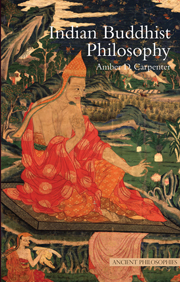Book contents
- Frontmatter
- Contents
- Preface
- Acknowledgements
- Abbreviations
- Chronology
- Development of Buddhist thought in India
- 1 The Buddha's suffering
- 2 Practice and theory of no-self
- 3 Kleśas and compassion
- 4 The second Buddha's greater vehicle
- 5 Karmic questions
- 6 Irresponsible selves, responsible non-selves
- 7 The third turning: Yogācāra
- 8 The long sixth to seventh century: epistemology as ethics
- Epilogue
- Background information
- Notes
- Bibliography
- Index
2 - Practice and theory of no-self
- Frontmatter
- Contents
- Preface
- Acknowledgements
- Abbreviations
- Chronology
- Development of Buddhist thought in India
- 1 The Buddha's suffering
- 2 Practice and theory of no-self
- 3 Kleśas and compassion
- 4 The second Buddha's greater vehicle
- 5 Karmic questions
- 6 Irresponsible selves, responsible non-selves
- 7 The third turning: Yogācāra
- 8 The long sixth to seventh century: epistemology as ethics
- Epilogue
- Background information
- Notes
- Bibliography
- Index
Summary
Formerly, one believed in ‘the soul’ as one believed in grammar and the grammatical subject: one said, ‘I’ is the condition, ‘think’ is the predicate and conditioned – thinking is an activity to which thought must supply a subject as cause. Then one tried with admirable perseverance and cunning to get out of this net – and asked whether the opposite might not be the case: ‘think’ the condition, ‘I’ the conditioned; ‘I’ in that case only a synthesis which is made by thinking.
(Nietzsche, Beyond Good and Evil, §54)No-self as practice
In ancient Greece, an inscription at the entrance to the Temple of Apollo at Delphi famously enjoined those who entered, ‘Know thyself. Socrates made this injunction central to his conception of philosophy and so of the good life, taking the pursuit of it to consist in an examination of one's own beliefs, especially beliefs about values, good and bad, right and wrong. Plato refers twice to this intriguing injunction: in the Phaedrus (230a) and Charmides (164d), where the nature of the soul (simple or complex?) and of our access to it (transparent or occluded?) are under discussion. But in the Alcibiades, ‘knowing thyself involves understanding your talents, family background, social status and material possessions, and how this places one to act in the world. For Aris-totle, knowing oneself involves a special sort of reflexive consciousness, together with the understanding that such consciousness is the finest thing in us and, in some sense, divine.
- Type
- Chapter
- Information
- Indian Buddhist Philosophy , pp. 20 - 47Publisher: Acumen PublishingPrint publication year: 2013

